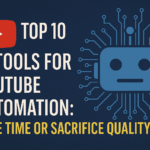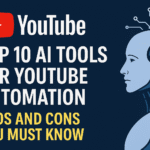Let’s face it—affiliate marketing isn’t what it used to be. A decade ago, you could throw up a blog, drop a few links, and watch commissions trickle in. But today, competition is fierce, algorithms are smarter, and audiences expect more. That’s where AI tools for affiliate marketing come in. These tools promise to save time, boost conversions, and optimize content. But do they live up to the hype? Or are they just another shiny object in an already crowded toolbox? In this deep dive, we’ll explore the best (and worst) AI tools for affiliate marketers, sharing the real benefits, limitations, and how to use them without getting lost in automation.
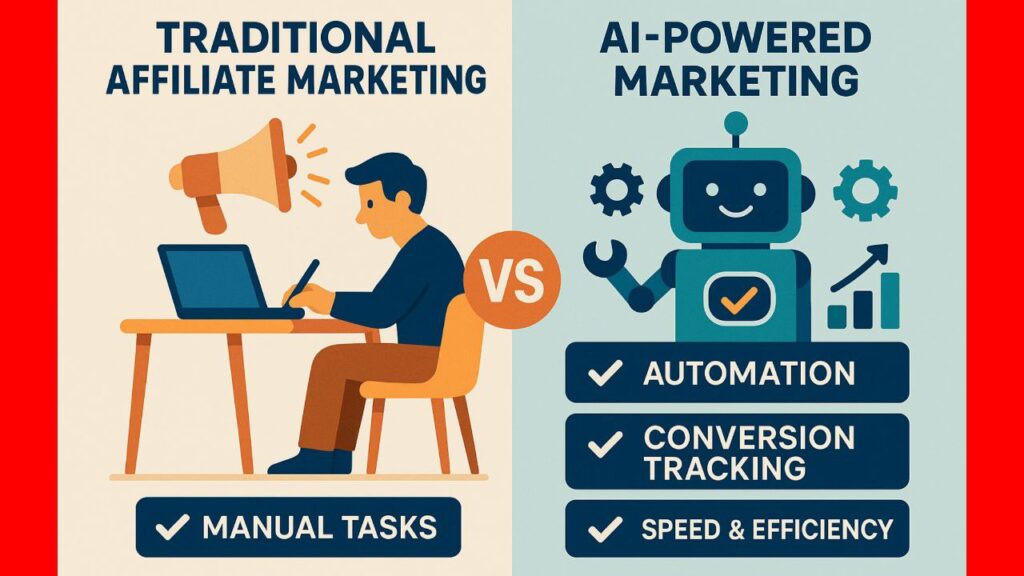
What Makes AI Tools for Affiliate Marketing So Powerful?
The best AI tools for affiliate marketing don’t just automate—they optimize. They help you create better content, understand your audience, and stay ahead of trends. Think about it: instead of spending hours researching keywords, analyzing competitors, or tweaking copy, AI can handle most of that grunt work. Tools like Jasper, Copy.ai, and Surfer SEO analyze high-performing content and replicate success. Others, like ChatGPT or Claude, help you brainstorm fresh content angles or write persuasive ad copy in minutes. But that doesn’t mean they’re foolproof. Rely on them too much, and your content might lose its human touch—something your audience can spot instantly.
Top AI Content Generators: Magic or Just Marketing?
When it comes to content generation, Jasper and Copy.ai are among the top picks. These AI tools for affiliate marketing claim they can write blog posts, social media captions, and even landing pages with minimal input. And to a degree, they do. You input your topic, set a tone, and the AI gets to work. The output? Often surprisingly good. But here’s the catch—it’s not always original or factually accurate. You still need to proofread, fact-check, and personalize the content to match your brand voice. If you’re a beginner, these tools can help break writer’s block. If you’re experienced, they can speed up content creation. Just don’t expect them to do all the thinking for you.
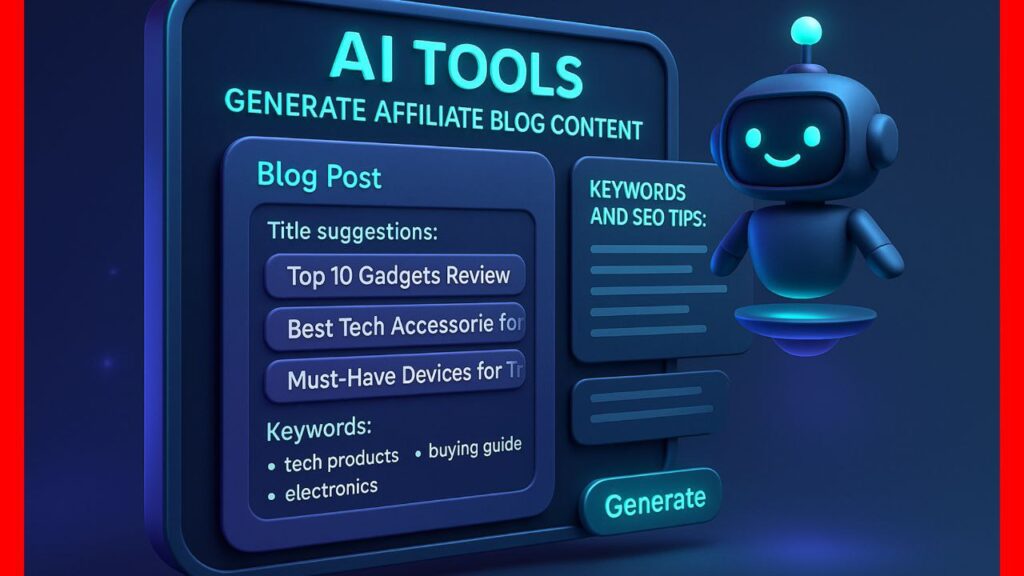
AI SEO Tools: Your Secret Weapon or a Crutch?
SEO is non-negotiable in affiliate marketing. That’s where AI SEO tools like Surfer SEO, NeuronWriter, and Frase step in. These tools analyze SERPs in real time, suggest keyword usage, and provide content score metrics. For affiliate marketers, this means you’re not guessing which keywords to target or how long your post should be. You’re building content with a strategic edge. However, AI tools for affiliate marketing in the SEO space can become a crutch. Some marketers obsess over content scores and forget that humans—not bots—are reading their pages. Use SEO AI tools to guide your content strategy, but don’t let them dictate every word. Balance data with creativity for the best results.
Email & Chat Automation: Personalized at Scale or Just Plain Robotic?
Affiliate marketing isn’t just about content; it’s also about nurturing leads. AI-powered email tools like Mailchimp’s Smart Recommendations or ConvertKit’s automation flows help segment your list and tailor messages based on behavior. Then there are chatbots like Tidio or Chatfuel that engage visitors instantly and guide them toward your affiliate offers. These AI tools for affiliate marketing can dramatically boost engagement and conversions—if used wisely. Go too far with automation, and your emails might feel cold, or your chatbot might miss the mark. The trick? Use AI to enhance human interaction, not replace it. Set up intelligent flows but keep personalization front and center.
Analytics & Optimization: Smarter Insights or Information Overload?
Tracking performance is crucial. AI-driven analytics tools like Plerdy, Crazy Egg, and Google Analytics 4 with predictive metrics help affiliate marketers understand what’s working and what’s not. These tools use machine learning to highlight trends, predict future behavior, and even suggest content tweaks. For example, AI can spot when a product link is underperforming or when your bounce rate spikes. But not all AI tools for affiliate marketing present insights in a user-friendly way. Some require a steep learning curve. Others flood you with too much data. The key is to focus on a few core metrics—like CTR, conversion rate, and time on page—and act on what matters most.
The Downsides of Relying Too Much on AI in Affiliate Marketing
Let’s be honest: not all that glitters is gold. While AI tools for affiliate marketing can be a blessing, overreliance has its pitfalls. First, AI isn’t always accurate. It may misunderstand context, misinterpret data, or pull from outdated sources. Second, AI lacks emotional intelligence. Your audience wants authenticity, not robotic content. Third, there’s the risk of uniformity. If every affiliate uses the same AI tool, the content starts looking eerily similar—bad for branding and SEO. Finally, AI can’t replace intuition. A seasoned affiliate marketer knows when to follow a trend and when to zig while others zag. Use AI as a tool, not a crutch. Your unique perspective is still your biggest asset.
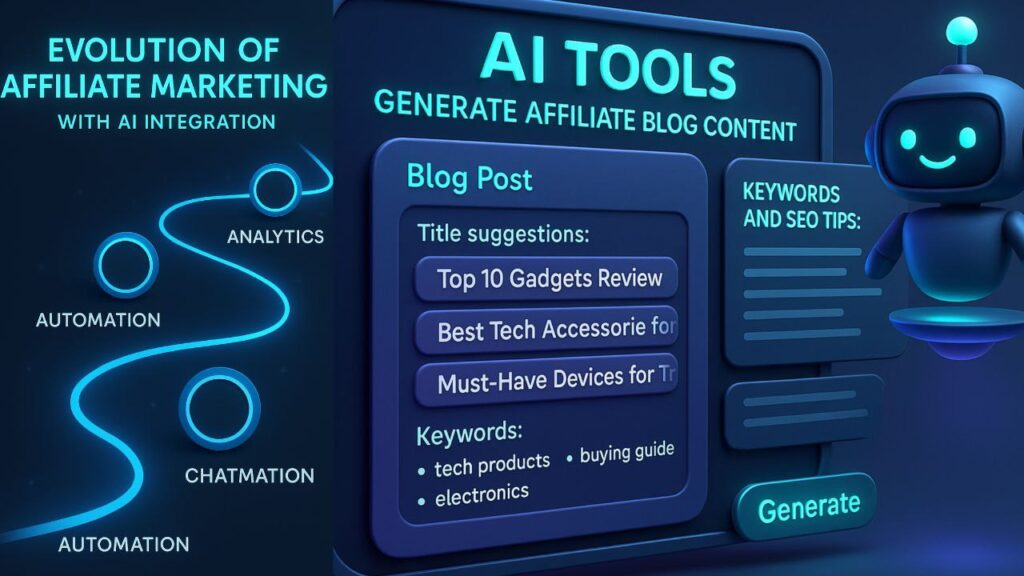
Best Practices for Using AI Tools for Affiliate Marketing in 2025
To get the most from AI tools for affiliate marketing, you need a strategy. First, start with a clear goal—are you optimizing for SEO, increasing engagement, or boosting conversions? Match the right tool to the task. Use content generators for brainstorming, SEO tools for optimization, and analytics platforms for decision-making. Always add a human layer. Edit, personalize, and contextualize AI outputs. Keep testing and refining your approach. And most importantly, stay updated. AI evolves fast. What worked last year may be outdated today. Combine machine efficiency with your marketing instincts to stay ahead of the curve.
The Final Verdict: Are AI Tools for Affiliate Marketing Worth It?
In short—yes, but with caution. AI tools for affiliate marketing can transform your workflow, sharpen your content, and boost your bottom line. They’re especially valuable for solo marketers or small teams trying to do more with less. But they’re not a silver bullet. You still need to think critically, write creatively, and connect authentically. The real magic happens when AI works alongside you, not in place of you. So go ahead, embrace the tools—but never forget the marketer behind the machine.
Top 5 FAQs About AI Tools for Affiliate Marketing
1. What are the best AI tools for affiliate marketing in 2025?
Some of the best AI tools include Jasper for content creation, Surfer SEO for optimization, Mailchimp for email automation, and Tidio for chatbot integration. Each serves a unique purpose, so the best tool depends on your specific affiliate marketing strategy.
2. Can AI really improve affiliate marketing results?
Yes, when used strategically. AI tools help you work faster, analyze data smarter, and personalize content more effectively. However, results still depend on human oversight and how well the tools are integrated into your overall marketing plan.
3. Is AI-generated content good for SEO in affiliate marketing?
AI-generated content can perform well if properly optimized and edited. Google values high-quality, helpful content, so it’s crucial to add your own insights and ensure the content meets user intent. Don’t just copy-paste AI output—enhance it.
4. Are there free AI tools for affiliate marketers?
Yes. Tools like ChatGPT (free version), Grammarly, and Google Bard offer powerful features at no cost. While premium tools often have more robust capabilities, free tools are great for getting started or testing before you invest.
5. Will AI replace affiliate marketers in the future?
Unlikely. AI is a tool, not a replacement. It can handle repetitive tasks and data analysis, but it lacks creativity, intuition, and emotional intelligence. The best results come from a human marketer leveraging AI, not being replaced by it.
Read more about AI tool:-
How to Write a Blog Using ChatGPT (With Prompt): A Beginner-Friendly Guide
How AI is Changing Freelancing: A Freelancer’s New Best Friend
Hi, I’m Santu Kanwasi, a passionate blogger with over 2 years of experience in content writing and blogging. I create original, informative, and engaging articles on a wide range of topics including news, trending updates, and more. Writing is not just my profession—it’s my passion. I personally research and write every article to ensure authenticity and value for my readers.
Whether you’re looking for fresh perspectives or reliable updates, my blog is your go-to source!


